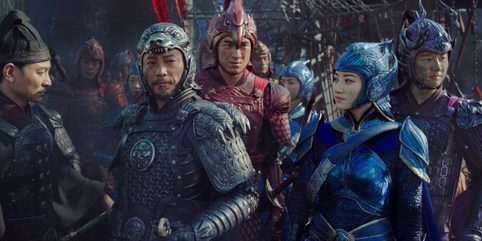C | European thieves encounter the grandeur of China in a fight for its life. Directed by Zhang Yimou Starring Matt Damon, Pedro Pascal, and Tian Jang Initial Review by Jon Kissel |

Yimou also wastes little time getting straight to the action. After withholding a look at the Tao Tieh with some cheesy action effects, the viewer doesn’t have to wait long before seeing them in their toothy glory. There’s creativity in the early epic battles, with the requisite tension before the enemy appears and the ordered chaos of combat. The Chinese army itself sticks to the national character of unity that Yimou extolled in his wuxia epic Hero, with each branch acting as one unit. Signaled by the cinematically powerful drums, arrows let fly in a huge mass, bungee jumpers drive spears into dinosaurs, and squads of ground troops stand ready to be annihilated by the monsters. William and Pero are right to be impressed because these are impressive scenes, silly though they obviously are.
Yimou does a great job in mixing up the action setpieces. One cannot call a movie The Great Wall and then hide it from the viewer, so he gets a straightforward defensive battle out of the way early before moving on to the tense objective of capturing a tao tieh and ultimately an assassination mission in an overrun city. Thanks to the strength of the creature design and making the tao tieh more than mindless beasts, the recovery mission achieves that difficult accomplishment of making me momentarily forget that this is obviously going to succeed. The assassination mission, however, is certainly the weakest, as the film runs out of creativity the longer it goes on. The six credited writers surely could’ve come up with a better weakness for the tao tieh than magnetism, and as the assassins get closer to the queen, Yimou fails to get to that aforementioned sweet spot and I’m instead waiting for them to get it over with already. The bad of the third act doesn’t wash out the good of the rest of the film, but it does lose what had made the film palatable.
The political philosophy of The Great Wall has to be brought up simply because it has one. Huge action movies don’t often contain anything like a national ethos, but there does seem to be something like that here. William’s spent his whole life fighting for survival, selling his services to this baron and that lord. He’s never had a sense of fighting for anything beyond broadening his own wealth. The Chinese, with their united government and existential threat, are fighting and dying to protect their homeland, something William doesn’t personally have but an impulse that he’s spent his life looking for. What this says about the loosely confederated European nations of the time is something like a full-throated endorsement of Chinese governance now, where not only have the consolidation of many districts into one allowed for technological wonders like the Wall, but the perfect enemy is revealed to be an army without will of its own beyond what their queen tells them through her vibrating crest. There’s no turnaround towards individualism as the film goes on. It’s individualism, in the form of an emperor’s greed, that brought the tao tieh to their door in the first place. The theme of cooperation and unity is shown to be right at the start and it’s still correct at the finish. Blind obedience is hardly a virtue, but The Great Wall wouldn’t exactly call it a vice.
Despite my distaste for the see-through validation of the Chinese mode of governance, I don’t hold it against the film. We’ve been getting these kind of films for decades, and I’m just not offended by other cultures aping ours and trying to export their values through fairy tales and spectacle. When they’re as fun and silly as Yimou’s vision is, so much the better. I enjoyed The Great Wall in spite of myself. Other effects extravaganzas like God of Egypt or Hansel and Gretel: Witch Hunters are either too dense with mythology or too stupid in their premise. The Great Wall gets a dumb genre just right. C+
 RSS Feed
RSS Feed